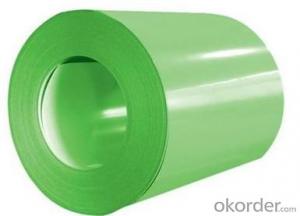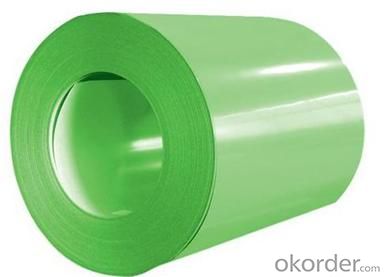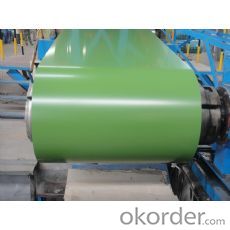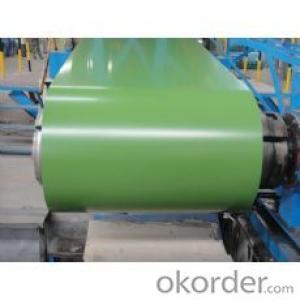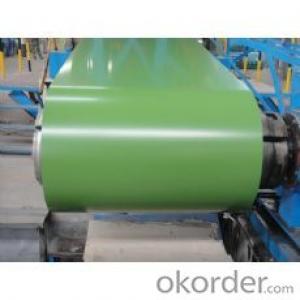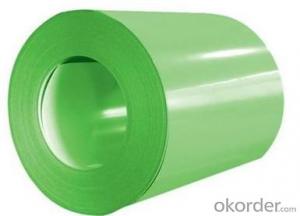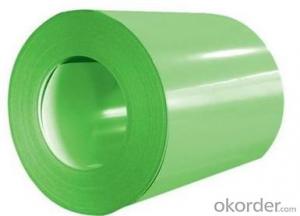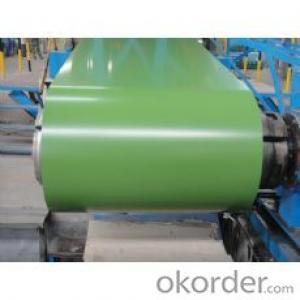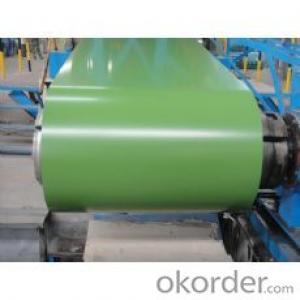Pre-Painted Galvanized/Aluzinc Steel Sheet in Coils in Green Color Good Quantity
- Loading Port:
- Shanghai
- Payment Terms:
- TT OR LC
- Min Order Qty:
- 100 m.t.
- Supply Capability:
- 10000 m.t./month
OKorder Service Pledge
OKorder Financial Service
You Might Also Like
1.Pre-Painted Galvanized/Aluzinc Steel Coil Description:
Pre-painted Galvanized/Aluzinc Steel Coil with GI or Aluzinc as base metal, vof decoration,molding,corrosion resistance,superior workability,durability and weather resistance
2.Main Features of the Pre-Painted Galvanized/Aluzinc Steel Coil
• Superior durability
• Good visual effect
3.Detail Images of Pre-Painted Galvanized Steel Coi
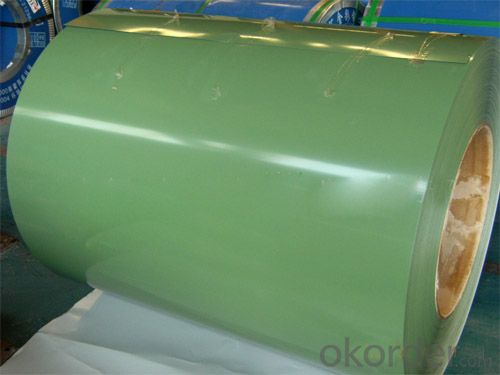
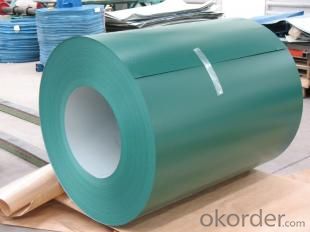
4.Specification of PPGI / GI Steel Sheet/Coil
1) AVAILABLE DESIGNATION OF PPGI/PPGL Prepainted Galvanized/Galvalume Steel Coils
Quality | Q/BQB 440-2003 | JIS G3312-1994 | EN 10326-2004 | ASTM A653-02a |
EN 10327-2004 | (BASE PLATE) | |||
(BASE PLATE) | ||||
Commercial Steel | TDC51D | CGCC | DX51D+Z/AZ | CS Type A/B/C |
Forming Steel | (TSt01,TSt02,TSt03) | CGCD1 | FS Type A, Type B | |
Drawing | TDC52D /TDC53D | - | DX52D+Z/AZ | DDS TYPE A/C |
Steel | DX53D+Z/AZ | |||
Structural | TS280GD(TStE28) | CGC400 | S280D+Z/AZ | SS275 |
Steel | TS350GD(TStE34) | CGC440 | S350D+Z/AZ | SS340 Class1 |
5.FAQ
1. How long can we receive the product after purchase?
Usually within thirty working days after receiving buyer’s advance payment or LC. We will arrange the factory manufacturing as soon as possible. The cargo readiness usually takes 15-25 days, but the shipment will depend on the vessel situation.
- Q: im buying a new guitar,, it has a built in tuner and its semi acoustic (can be plugged into an amplifier) ,, im trying to choose which strings are better ,, steel or nylon..?
- i have steel and i like the way it sounds but i like nylon better
- Q: What are the common methods of forming steel coils?
- The common methods of forming steel coils include hot rolling, cold rolling, and strip casting.
- Q: How are steel coils used in the manufacturing of engine components?
- Steel coils are used in the manufacturing of engine components as they provide strength and durability. They are typically processed and shaped into various parts such as connecting rods, crankshafts, and camshafts, which are essential for the engine's functionality. The coils are formed, machined, and heat-treated to meet the precise specifications required for each component, ensuring optimal performance and reliability in engines.
- Q: What are the common certifications required for steel coils?
- The common certifications required for steel coils depend on the specific industry and application of the coils. However, there are several widely recognized certifications that are commonly required. 1. ISO 9001: This certification ensures that the manufacturer has implemented a quality management system that meets international standards. It verifies that the manufacturer has the necessary processes and controls in place to consistently produce high-quality steel coils. 2. ISO 14001: This certification focuses on environmental management systems. It ensures that the manufacturer is committed to minimizing its environmental impact and reducing waste in the production process. 3. ISO 45001: This certification pertains to occupational health and safety management systems. It ensures that the manufacturer has implemented measures to protect the health and safety of its employees and stakeholders. 4. ASTM International Standards: The American Society for Testing and Materials (ASTM) has established various standards for steel coils. These standards cover aspects such as chemical composition, mechanical properties, and dimensional tolerances. Compliance with these standards ensures that the coils meet the specified requirements and are suitable for their intended use. 5. EN Standards: The European Committee for Standardization (CEN) has developed a set of standards for steel coils, known as EN standards. These standards cover similar aspects as ASTM standards but are specific to the European market. 6. JIS Standards: The Japanese Industrial Standards (JIS) are widely used in the steel industry in Japan and other countries in Asia. Compliance with JIS standards ensures that the coils meet the specific requirements of the Japanese market. 7. Product-specific certifications: Depending on the application of the steel coils, additional certifications may be required. For example, if the coils are intended for automotive use, certifications such as ISO/TS 16949 (Quality Management Systems for the Automotive Industry) may be necessary. It is important to note that the specific certifications required may vary depending on the region, industry, and customer requirements. Manufacturers should consult with their customers and industry standards organizations to determine the exact certifications necessary for their steel coils.
- Q: Why are properties of steel not identical?
- Grade 440C is one of the highest strength stainless steels. It is also very wear resistant. Good for use as ball bearings and other high wear applications. 400C has the highest carbon content of the 440 steels. 440A and 440B are identical but have lower carbon contents and have lower strengths and higher corrosion.
- Q: I know that mild steel is more brittle than cast iron....but that is all.......please help??Thank you in advance......Ruby:D
- Actually, the opposite is true. CAST IRON is generally brittle, while mild steel is not. Cast iron has a carbon content from about 2%-4%. Mild steel has less than one tenth as much carbon as cast iron- around 0.2% - 0.3%. Cast iron also typically has from 1%-3% silicon. Most mild steel contains no more than 0.3% silicon. Steel melts at ~1450 degrees C. The addition of large amounts of carbon and silicon to C.I. lower the melting point to around 1200 C and make it more fluid than molten steel. Obviously this makes it easier to melt and to pour. The main advantage of cast iron is it's cheap to produce. It also has some desirable properties despite it's brittleness. For example it's easy to cut and carve with machine tools. It's also very heat resistant and excellent at absorbing vibration. For this reason C.I. was commonly used for engine blocks and exhaust manifolds in cars and trucks in the past, (Cast aluminum engine blocks are more common these days because Al is much lighter and conducts heat better.) Cast iron also rusts much more slowly than steel which is why it's still commonly used for pipes. C.I. pipes have been known to last 300 years.
- Q: What are the dimensions of steel coils used in the energy sector?
- The dimensions of steel coils used in the energy sector vary depending on the specific application and requirements. However, common dimensions range from 0.3 to 3 millimeters in thickness and 600 to 2000 millimeters in width. The inner diameter of the coil typically ranges from 508 to 610 millimeters, while the outer diameter can vary from 1000 to 2000 millimeters. It's important to note that these dimensions can be customized to suit different needs and specifications.
- Q: Can steel coils be used in corrosive environments?
- Yes, steel coils can be used in corrosive environments, but their performance will depend on the type of steel and the severity of the corrosive environment. Stainless steel coils, for example, are highly resistant to corrosion and can be used in a wide range of corrosive environments, including those with high levels of moisture, chemicals, or salt. However, other types of steel coils may require additional protective measures, such as coatings or galvanization, to enhance their resistance to corrosion. It is important to consider the specific corrosive factors present in the environment and choose the appropriate type of steel and protective measures to ensure the longevity and durability of the steel coils.
- Q: How do steel coils contribute to the automotive aftermarket?
- Steel coils contribute to the automotive aftermarket by serving as a crucial raw material for manufacturing various components used in vehicles. These coils are responsible for providing strength, durability, and structural integrity to parts like body panels, chassis components, suspension systems, and exhaust systems. Additionally, steel coils are also used in the production of aftermarket accessories such as bumpers, grilles, and custom body kits. Their availability and versatility make steel coils an essential resource for the automotive industry, enabling the production of high-quality aftermarket products that enhance the performance and aesthetics of vehicles.
- Q: I'm in the process of buying a new car, and wondering if there are more benefits from Aluminum tire rims over Steel. Aluminum wheels cost more, but you'd think that steel would last longer. Are Aluminum wheels just for looks?
- Steel rims are stronger and will endure more abuse and curb scrapes. Aluminum rims are lighter and give the car a better ride due to less unsprung weight, but they require more maintenance and are easier damaged. I guess the final decision is up to you.
Send your message to us
Pre-Painted Galvanized/Aluzinc Steel Sheet in Coils in Green Color Good Quantity
- Loading Port:
- Shanghai
- Payment Terms:
- TT OR LC
- Min Order Qty:
- 100 m.t.
- Supply Capability:
- 10000 m.t./month
OKorder Service Pledge
OKorder Financial Service
Similar products
Hot products
Hot Searches
Related keywords
